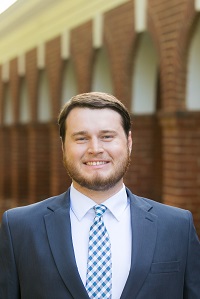

Written by Cassie Price
With a bang of his gavel, Chairman Emmett Hanger abruptly ended the May 29 Virginia Senate Finance Committee meeting, after declaring Senate Majority Leader Thomas Norment out of order. Hanger realized just in time that Norment’s attempted parliamentary maneuver would prevent a vote on Medicaid expansion from reaching the full Senate, effectively shutting down the possibility of Medicaid expansion in Virginia in 2018.
The next day, the Virginia Senate and House of Delegates voted to expand Medicaid to an additional 400,000 low-income Virginians.
Dillon Wild witnessed first-hand the dramatic turn of events at the May 29 committee meeting. He attended the meeting on the second day of his internship with Voices for Virginia’s Children, which advocated for Medicaid expansion as a way to improve family health outcomes and economic stability.
“It was a really exciting introduction to my internship,” said the graduate student at University of Virginia’s Frank Batten School of Leadership and Public Policy. “I saw how something seemingly small could change the course of politics.”
Dillon learned about the Voices internship when a Batten School counselor sent around a list of internship postings. “I recognized Voices because I had used Voices’ KIDS COUNT data for a paper I wrote on children’s mental health,” he said.
He traced his initial interest in children’s issues to discussions with his mother, an early childhood educator. She often spoke of the lack of resources available to meet the needs of low-income children, he said.
This spring, Dillon explored children’s issues in more depth through a social policy course taught by a UVA professor who had lobbied Congress on behalf of children.
Dillon’s summer internship focused on two projects: researching the Family First Prevention Services Act (FFPSA) and Voices’ campaign to promote trauma-informed policies and practices.
The FFPSA reforms federal funding of the foster care system in order to prevent children from entering foster care and to improve the well-being of children already in foster care.
“I read the legislation several times and thought about what Voices needs to do to be ready for the implementation of Family First,” Dillon said. “I met stakeholders and legislators working on this and assisted Voices’ foster care policy analyst Allison Gilbreath in creating an informational Family First webinar and the accompanying slides.
“My trauma research involved looking at how other states expanded trauma-informed policy and practice across institutions, agencies, and organizations.”
Now back at UVA, Dillon has been talking to his classmates about their internships.
“I realized I was lucky to work with Voices,” he said. “Voices does a really good job of exemplifying best practices for forming public policy, as we are learning about it in my program.
“For example, Voices’ policy director Emily Griffey made a list of stakeholders and community partners who should be involved in the trauma-informed agenda. At the first meeting with our trauma-informed partners, she asked, who is missing? Who else should we invite? This taught me the importance of including all stakeholders when crafting public policy.”
He recalled a UVA classmate speaking about her internship with a nonprofit that had no data to back up its policy agenda. “By contrast, the KIDS COUNT data supports Voices’ public policy,” he said.
Dillon will continue his internship with Voices on a part-time basis this semester and will work with Voices on his master’s capstone project next semester.
“I feel very lucky to have had this experience with Voices,” Dillon said. “I learned a lot more than I thought I would. Going forward, I want to stay involved with children’s policy.”
Read More Blog Posts